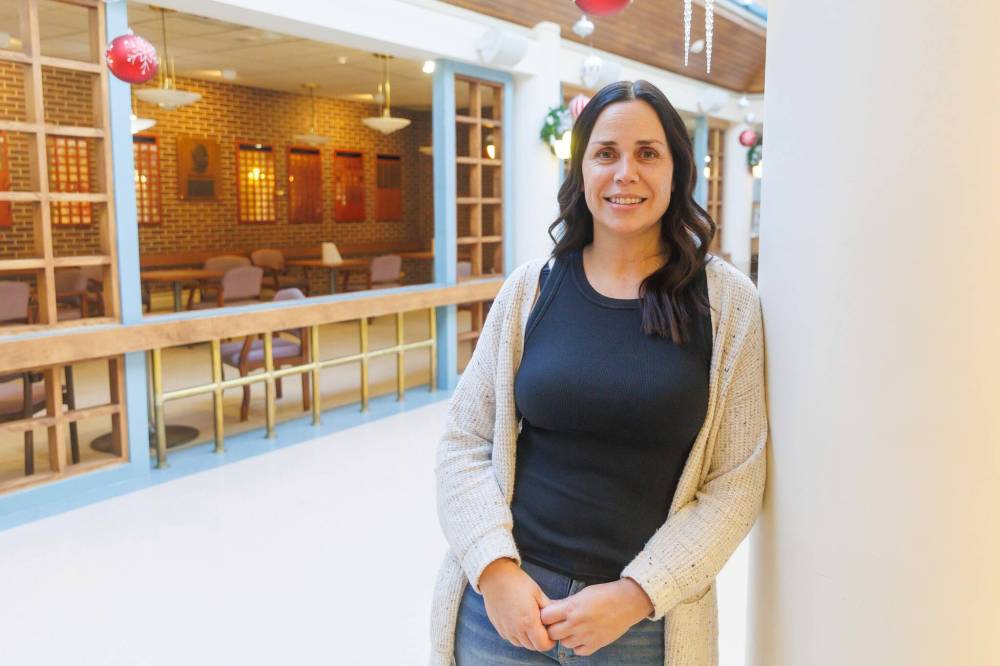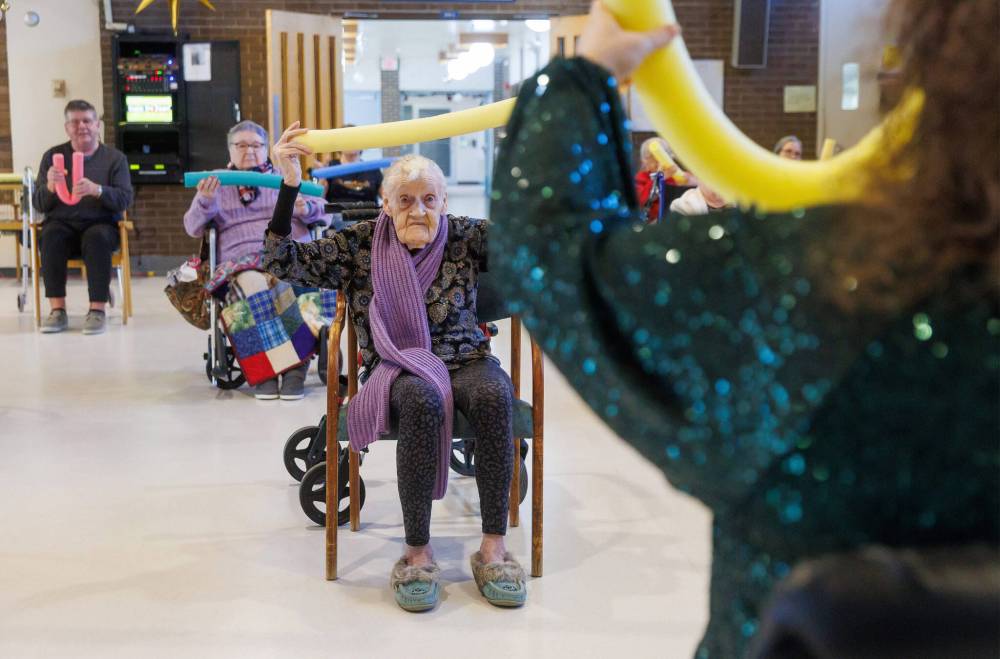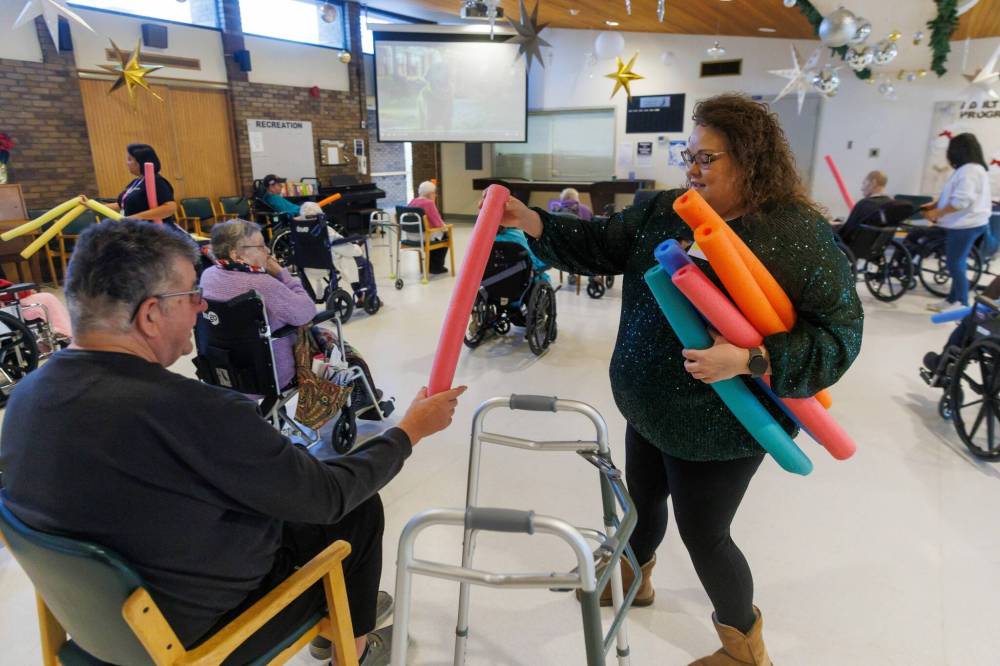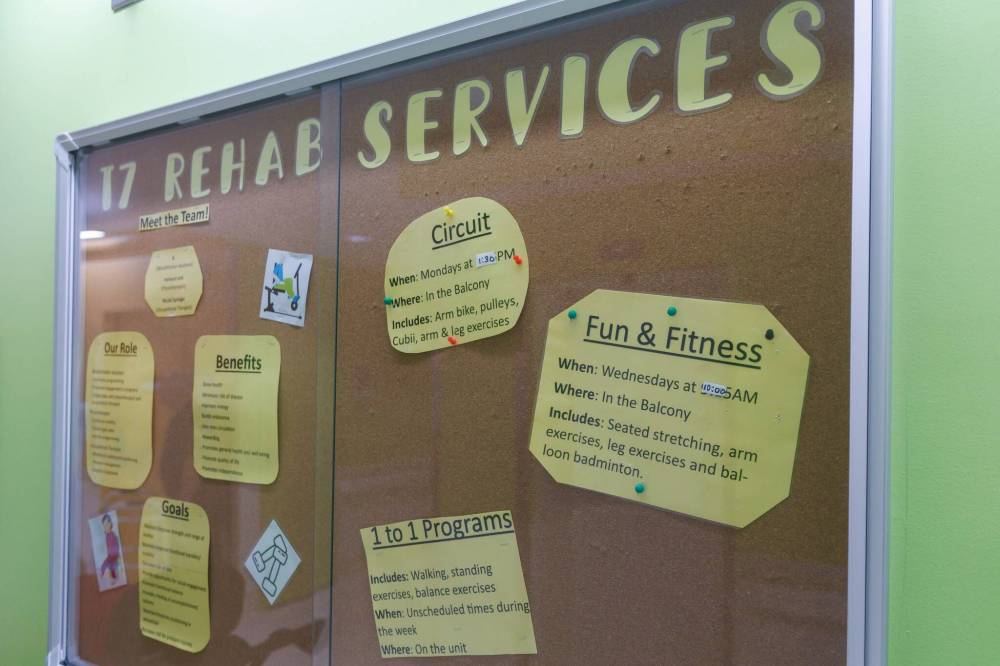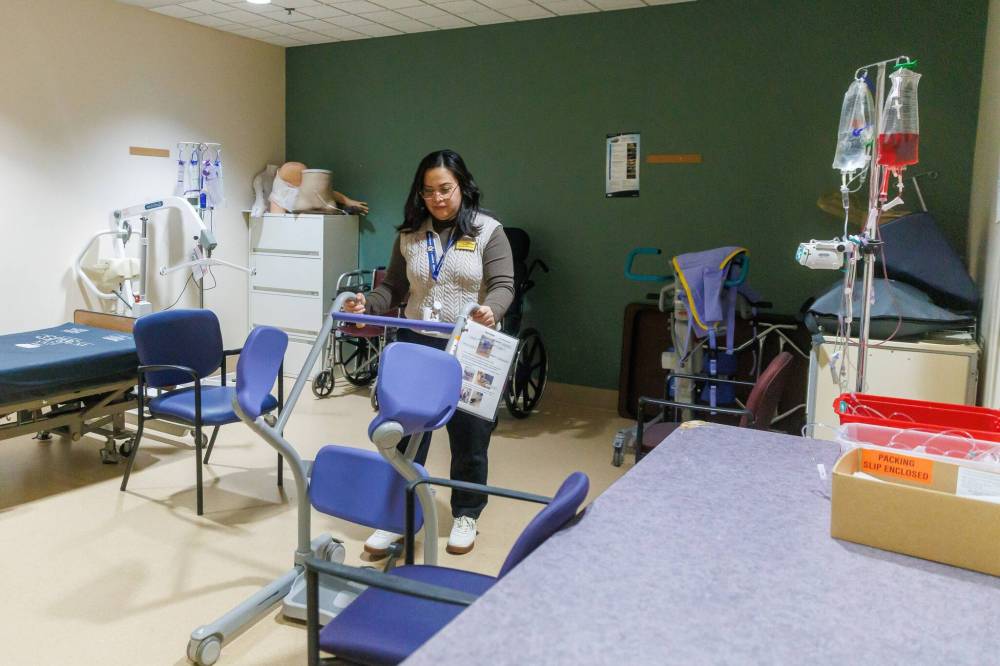‘If you don’t use it, you lose it’ Care home staff get creative to keep residents physically and mentally stimulated
Read this article for free:
or
Already have an account? Log in here »
To continue reading, please subscribe:
Monthly Digital Subscription
$0 for the first 4 weeks*
- Enjoy unlimited reading on winnipegfreepress.com
- Read the E-Edition, our digital replica newspaper
- Access News Break, our award-winning app
- Play interactive puzzles
*No charge for 4 weeks then price increases to the regular rate of $19.00 plus GST every four weeks. Offer available to new and qualified returning subscribers only. Cancel any time.
Monthly Digital Subscription
$4.75/week*
- Enjoy unlimited reading on winnipegfreepress.com
- Read the E-Edition, our digital replica newspaper
- Access News Break, our award-winning app
- Play interactive puzzles
*Billed as $19 plus GST every four weeks. Cancel any time.
To continue reading, please subscribe:
Add Free Press access to your Brandon Sun subscription for only an additional
$1 for the first 4 weeks*
*Your next subscription payment will increase by $1.00 and you will be charged $16.99 plus GST for four weeks. After four weeks, your payment will increase to $23.99 plus GST every four weeks.
Read unlimited articles for free today:
or
Already have an account? Log in here »
Hey there, time traveller!
This article was published 30/12/2024 (348 days ago), so information in it may no longer be current.
It’s just after 10 a.m. on a recent Friday morning and a woman with a grey-haired bob is pedalling on a stationary bike — a new piece of equipment at Fred Douglas Lodge that can be used while in a wheelchair — as she hums along to O Holy Night.
The senior, a retired pianist, requested a playlist of Christmas classics for today’s workout.
Since she is hard of hearing, a rehabilitation aide in blue scrubs is holding up a portable speaker to her right ear so she can both break a sweat and participate in a solo sing-along.
‘We are a firm believer in, “If you don’t use it, you lose it,’ ’’ says Tatiana Morcilla, manager of resident experience at Fred Douglas Lodge.“Five more minutes,” says the employee, who takes song requests to motivate residents, as the session nears an end.
The adaptable workout machine has piqued many individuals’ interest, but staff at the personal care home say it still takes a combination of education, encouragement and persuasion to keep them active.
“We are a firm believer in, ‘If you don’t use it, you lose it,’” said Tatiana Morcilla, manager of resident experience at the campus at 1275 Burrows Ave.
Fred Douglas Lodge is typically the last place its residents, who generally range between the ages of 54 to 105, will call home.
Most seniors wrapped up their formal schooling long before their move-in day, but learning, especially upon their arrival and as they navigate changing medical conditions, is central to their daily lives at the 136-bed facility.
“Recreation, oftentimes, is overlooked in terms of hiring and how important it is to be appropriately staffed and appropriately resourced.”– Stephanie Chesser
It comes in the form of everything from clinician reminders about the benefits of exercise to regularly scheduled activities, such as trivia, nondenominational church services and pool-noodle hockey.
A diverse recreation spread is key to address loneliness, facilitate fun, and maintain participants’ cognitive health and functioning, said Stephanie Chesser, a research affiliate at the University of Manitoba Centre on Aging.
“Recreation, oftentimes, is overlooked in terms of hiring and how important it is to be appropriately staffed and appropriately resourced,” said the associate professor in the faculty of kinesiology and recreation management.
For Chesser, these programs — be they for enjoyment or for therapeutic reasons — are much more than entertaining add-ons and affect every element of well-being, from spiritual health to physical functioning.
Long-term care residents’ physical performance across the Winnipeg Regional Health Authority is slightly below national averages, as per an online database managed by the Canadian Institute for Health Information.
Ellen (front) raises her noodle above her head while participating in noodle hockey, a popular recreational activity at Fred Douglas Lodge on Burrows Avenue.Performance in local facilities dropped between individual assessments conducted in 2020-21 and 2021-22. It has improved in recent years, but the overall number has yet to reach the pre-COVID-19 pandemic precedent.
Just over one-quarter of the population aged 65 and up is “at risk of frailty,” online records show.
Chesser surveyed recreation employees in these settings around the end of the first wave of the virus to get a feel for how their programs were affected.
She found many staffers, in response to public health measures, pivoted from planning leisure activities to setting up visits between residents and loved ones via telephone, window panes and Zoom.
“The pandemic really emphasized this point that recreation is an essential, essential program that is offered in long-term care.”– Stephanie Chesser
“The pandemic really emphasized this point that recreation is an essential, essential program that is offered in long-term care,” said the researcher who describes the employees who facilitate it as creative “superheroes.”
The Fred Douglas recreation department organizes lessons, in more traditional terms, for residents around holidays, such as Ukrainian Christmas and Chinese New Year, during which they eat traditional food and learn about cultural celebrations.
An Indigenous elder recently went to the care home to talk about the National Day for Truth and Reconciliation and honouring survivors who were separated from their families and cultural practices at residential school.
Ahead of the autumn visit, seniors learned how to make bannock and crafted drums out of used paper towel rolls, string, feathers, construction paper and beads.
“We’re a non-profit so we’re really creative,” Morcilla said, followed by a chuckle, adding that participants loved drumming alongside the special guest — perhaps unsurprisingly, given live music events are always well-attended and battle bingo for the top spot on the most popular activity list.
Activity worker, Jenna Corby, hands out pool noodles to residents participating in “noodle hockey” a popular recreation activity at Fred Douglas Lodge.Around the same time, employees received reconciliation-themed training and had the opportunity to smudge at a traditional outdoor ceremony for community members to purify and cleanse negative thoughts.
Leonora De Lino, a registered nurse, describes learning in the long-term care setting as multi-faceted.
The director of care and her colleagues’ lessons target three groups: residents; family members; and employees, via scheduled classes and spontaneous ones.
Their overarching goal is to promote low-impact exercise, healthy nutrition and socialization to provide the best quality of life for every resident during their final years.
Family members are taught about visiting protocols on the campus and levels of advanced care planning.
The residence invited relatives to a lawyer-led information session covering the role of a will executor, power of attorney shifts, and related subjects earlier this year.
For employees, professional development is ongoing to meet changing requirements in the health region, such as patient handling 101 for nurses and health-care aides, De Lino said.
She noted the care home is gearing up to roll out “gentle persuasive approach” training for its nurses in the new year.
“The very reason for this is approaching residents on dementia (units) takes lots of understanding of the disease process because there’s lots of back-and-forth with dementia clients,” added the former COVID-19 investigator for Shared Health.
Following the pandemic, staff say there’s been a push to keep ensuring everyone who lives, visits and works at the Fred Douglas Society’s various sites — supportive housing, life-lease suites and low-cost apartment units — is knowledgeable about proper hand hygiene and cough etiquette.
MIKE DEAL / FREE PRESS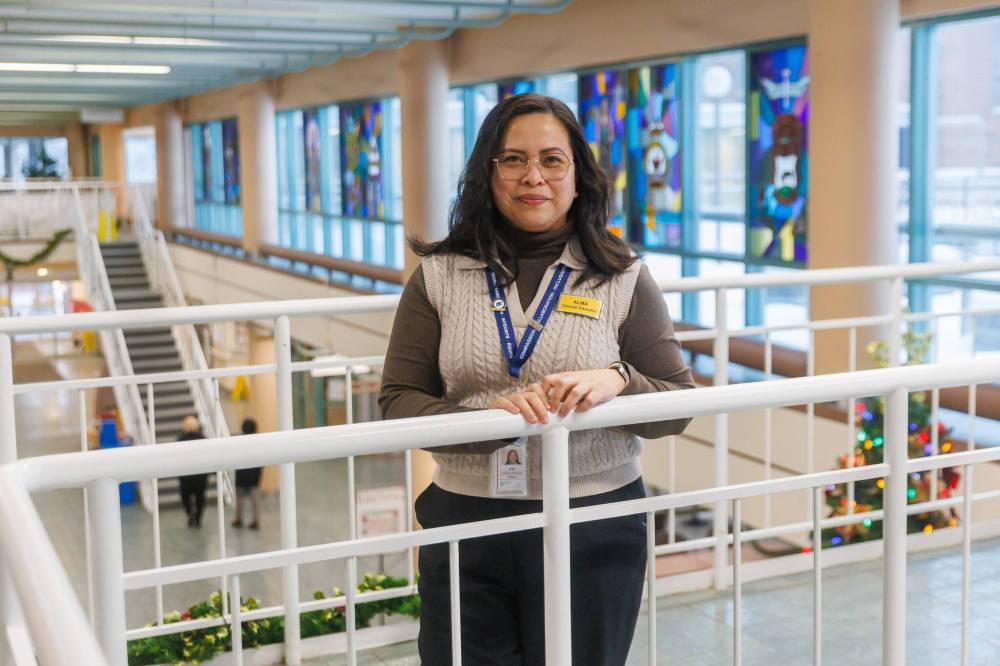
The same can be said at Deer Lodge Centre, home to 418 rehabilitation and long-term care beds, at 2109 Portage Ave.
The wide-ranging health-care facility has not been exempt from outbreaks and their fallout. As a result, management indicated all employees are urged to be diligent about flagging and monitoring symptoms of respiratory illness.
Ray Ricard, 59, moved into the residence in 2020, about six weeks before Manitoba went into lockdown in response to the first cases of COVID-19 being detected.
Following an unusual transition period interrupted by lockdowns that affected day-to-day operations and recreation schedules, Ricard has settled into a routine.
He is co-chair of the residents council — “I needed something to do,” he said — and a regular at bingo.
The latter, a favourite activity of his, is a twice-a-week opportunity to socialize with neighbours and win small prizes.
“There is a bit of competitive nature to the game,” he said.
Alma Lubos, who trained as an emergency room nurse in the Philippines before immigrating to Canada in 2001, has climbed the clinical ranks of Deer Lodge over the last 15 years.
Now, her job is to stay on top of changing workplace regulations and training health-care professionals accordingly to provide what she calls “dignified, patient-centred care” to Ricard and other residents.
One of the notice boards highlighting upcoming events at Deer Lodge Centre on Portage Avenue.The clinical educator is currently finalizing a month-by-month education calendar for staff for 2025.
This year’s edition, posted on the door of her sixth-floor office and throughout the facility, has a dozen focus areas, with restraints (March), enteral feeding (June), and influenza outbreak review (October) listed among them.
“With the ER, it’s more in-and-out. Here, you have to consider, ‘What are the diets? What’s the medical condition? What’s the patient’s medication? Why is the patient falling around this time?’ We’re doing behaviour mapping. We’re doing hourly rounding just to see, to catch the triggers, to prevent (incidents) from happening again or at least mitigate it,” she said.
Given the stark difference in daily tasks, Lubos said there’s a common misconception in the nursing profession that long-term care work is cushy and ideal for nurses who are near retirement.
“We have to debunk that myth because you need a lot of skills, too, in a (care home).”– Alma Lubos
“We have to debunk that myth because you need a lot of skills, too, in a (care home),” she said, before listing off the importance of being skilled in delivering quality psycho-social and trauma-informed care.
While giving a reporter a midday tour of the seventh floor, she stopped to smile and nod at a colleague who was trying to calm down a hyperventilating resident at a communal table.
Hallways on the unit, where many people with varying stages of dementia live, are painted hot pink — a colour believed to uplift moods and decrease aggression — and lime green, to increase residents’ visual attention.
Event and informational posters line the walls, promoting rehabilitation services and their benefits for participants’ bone health, endurance, energy levels, circulation and independence.
Every resident’s door is decorated with a name and profile photo of themselves, a homey touch that Lubos said is also to help individuals find their rooms.
The clinical educator noted she often reminds staff they are caring for people on some of their hardest days and must remember they have never seen residents at their best.
Alma Lubos is in charge of keeping all clinicians up to date with training on everything from dehydration prevention to communication with patients.Full-time residency is, on average, about two years, Lubos noted.
Regardless of changing needs during one’s stay, deteriorating health conditions and at times, behaviour that frustrates staff, the nurse is a vocal proponent of practising empathy.
One of her common spiels? “We’re looking after doctors or nurses or teachers — professionals at one point in their careers, very productive in the community, and it just so happens that something bad happened to them and they’re here,” she said.
Lubos said she entered her line of work, while openly admitting it sounds cliché, because she wanted to help people during vulnerable points in their lives.
“It’s always a good self-reflection that one day, we can be like them,” she said, referring to both the patients who check into Deer Lodge temporarily and its personal care home residents. “So, be kind!”
maggie.macintosh@freepress.mb.ca

Maggie Macintosh
Education reporter
Maggie Macintosh reports on education for the Free Press. Originally from Hamilton, Ont., she first reported for the Free Press in 2017. Read more about Maggie.
Funding for the Free Press education reporter comes from the Government of Canada through the Local Journalism Initiative.
Every piece of reporting Maggie produces is reviewed by an editing team before it is posted online or published in print — part of the Free Press‘s tradition, since 1872, of producing reliable independent journalism. Read more about Free Press’s history and mandate, and learn how our newsroom operates.
Our newsroom depends on a growing audience of readers to power our journalism. If you are not a paid reader, please consider becoming a subscriber.
Our newsroom depends on its audience of readers to power our journalism. Thank you for your support.

